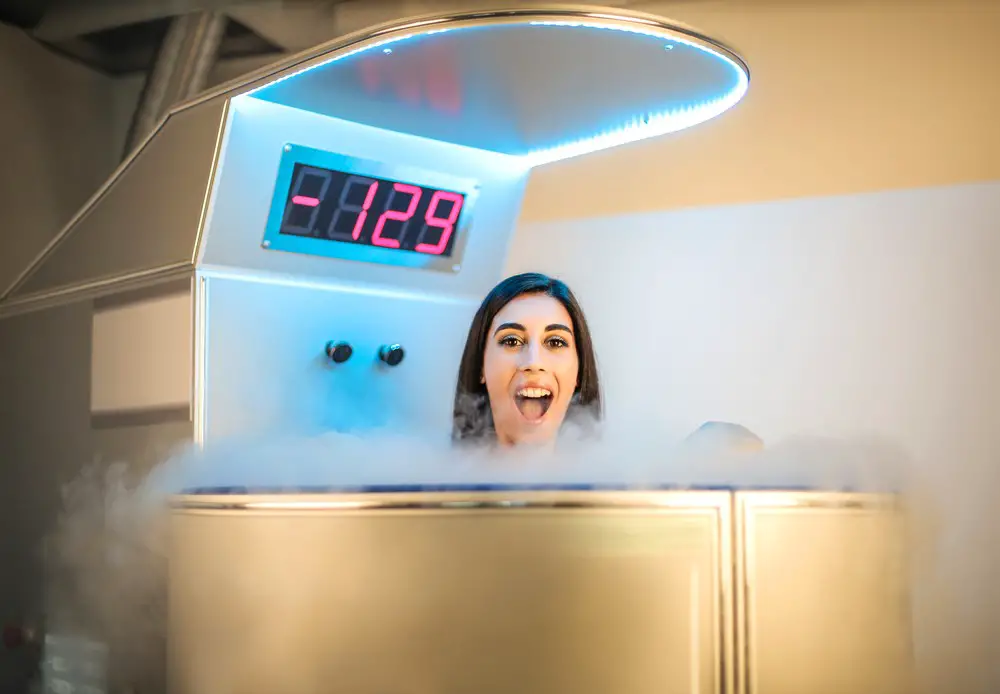As a BetterHelp affiliate, we receive compensation from BetterHelp if you purchase products or services through the links provided
Cold-water immersion and cryotherapy enthusiast numbers continue to grow. They rave about how therapeutic it is to swim in winter, take cold showers, or use cryotherapy chambers. According to them, cold therapy offers physical and mental benefits, including stress reduction.
Cold Water Therapy and Research
Studies on cold water exposure and immersion are mostly inconclusive because of certain factors, including duration and intensity. However, cold showers do relieve the symptoms of anxiety and stress, and one study showed how a 24-year old open water swimmer managed to combat the symptoms of depression she suffered since she was 17 years old.
Going back in history, we know that Hippocrates believed in the therapeutic effects of cold water therapy for exhaustion. The benefits of hydrotherapy continued to be praised by the forefather of natural medicine, Sebastian Kneipp, in the 19th and 20th centuries. Thomas Jefferson also credited his good health to his early morning foot baths in cold water.
Effects of Cold Therapy on The Mind
Anxiety and depression can affect your mental health. Read on to find the several ways cold therapy helps to improve your mind:
The Vagus Nerve Connection
There is a correlation between mental health and several stress-related conditions. The vagus nerve connects our brain with our organs, and its job is to turn off the protective ‘fight-or-flight’ response we have to stressful situations.
Exposure to cold water activates the nerve, ensuring that your heart rate and breathing return to normal, relieving you of bouts of prolonged stress or anxiety.
Mood Elevating Hormones
We know that some hormones and neurotransmitters can improve the symptoms of anxiety, stress, and This article explores the effects cold therapy has on your mind and how it can help you reduce stress. These mood-elevating hormones include beta-endorphins, noradrenaline, and dopamine and cold water immersion increase their production. Jumping into cold water changes the chemistry within the brain and body instantly, which is communicated to the brain, improving your mood.
An Instant Ice Pack to Fight Inflammation
Researchers are now studying the effects of inflammation on the mind and mood. The anti-inflammatory effects of cold water appear to act like an ice-pack on the system, reducing the inflammation that leads to stress and anxiety.
Sensory Information
The skin’s surface has a vast concentration of nerve endings that act as sensory receptors. Cold therapy simultaneously activates all these receptors and instantaneously sends the sensory information to the brain. Scientists believe that this burst of information relieves depression by pausing or interrupting the neurological cycles that lead to it and other mental health issues.
Repeat Exposure and Stress Resilience
The survival mode effects of cold water are temporary. Some researchers say the best way to ensure stress relief is by repeated yet brief exposure to the physical stress of cold therapy. Yet again, others feel that the body may develop a resilience to the cold stimulation, rendering it less effective.
Adverse Side Effects of Cold Therapy
There are several risks and dangers to plunging yourself in cold water. Hypothermia is the most obvious, something which will set in after about 30 minutes for adults in cold water.
The initial cold shock of getting into cold water carries another danger – the risk of arrhythmia or heart attack.
When people put their faces underwater, the risk of arrhythmia increases when they experience the “cold shock.” This is because opposing sides of the nervous system are activated, sending mixed signals to the heart. Another danger is that the initial plunge into cold water triggers what is known as the gasp reflex, which is followed by hyperventilation. If this happens while you are underwater, it can lead to drowning.
Finally, swimming in cold water leads to exhaustion, which increases the risk of drowning.
Safety and Cold Therapy
Whatever cold therapy you choose, make sure first to get your doctor’s permission and do it in a supervised environment. If you prefer cold water immersion by swimming outdoors, consider doing it as part of a group with locals who know the dangers of swimming in the area.
Avoid diving into the cold water headfirst to avoid the dangers mentioned above. Instead, ensure there is a way to get out of the water before getting in to prevent hypothermia.
Who Should Try Cold Therapy
There are various ways to enjoy cold therapy. Whether you build a small plunge pool, have a cold shower, or swim in a lake or ocean, remember, the best way to enjoy it is in short spurts of exposure, after which you should wear warm clothes and do warming exercises.
- 3 Ways Wearing a Hat Can Help Lower Your Stress Levels - April 19, 2025
- Breaking the Silence: Why Men’s Mental Health Matters More Than Ever - April 15, 2025
- How to Transform a Home’s Patio Space into a Relaxing Space - March 23, 2025
This site contains affiliate links to products. We will receive a commission for purchases made through these links.



